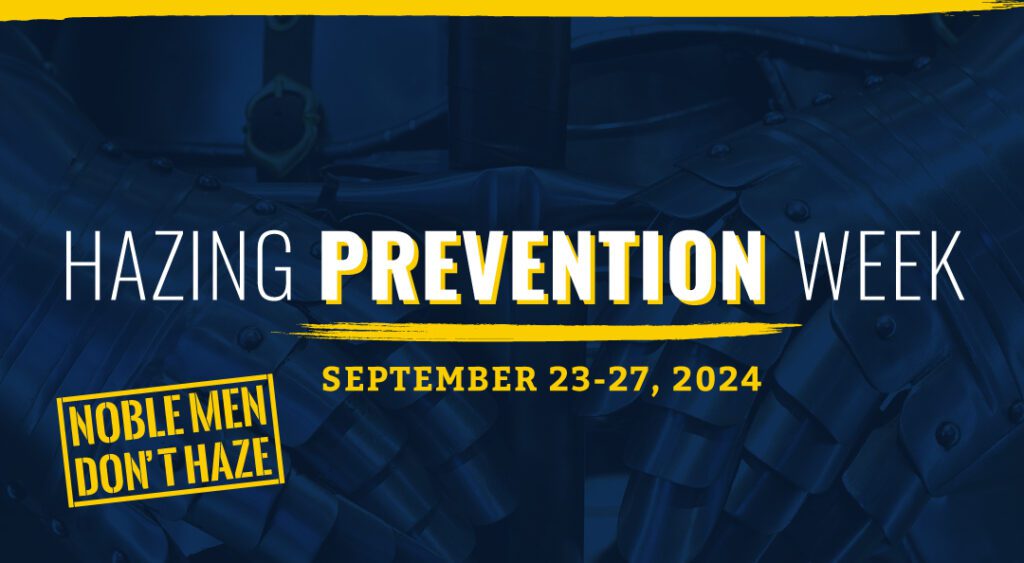National Hazing Prevention Week

CARMEL, INDIANA – Research indicates that 55% of college students involved in fraternities, sororities, teams, and other student organizations report experiencing hazing, yet only 1 in 10 recognize and label it as hazing (Allan, E.J. & Madden, M., 2008). This disconnect is especially prevalent with certain behaviors that may be harder to identify as hazing, such as sleep deprivation, personal servitude, calisthenics, or restricted communication. Regardless of whether these actions are subtle, harassing, or violent, they are all forms of hazing.
Why is it crucial to stop hazing in all its forms? When examining recent hazing scandals that have resulted in serious injury or death, do you think these incidents began with the most extreme forms of hazing? While this may have been true in some cases, what often happens is that hazing starts off seemingly harmless. For example, new members might be asked to wear the same shirt on a specific day of the week. Over time, however, the demands escalate. Perhaps next, new members are told to stay overnight at the chapter house, ensuring a particular chair is always occupied. Though this may not seem immediately harmful, blurring the lines of what is “acceptable” is how chapters gradually rationalize more dangerous practices.
Recognizing the signs of hazing is essential for creating an environment where all members take responsibility for preventing it within their organizations. Know the signs. Know you have a voice.
What are some examples of subtle hazing? Harassing hazing? Violent hazing?
- Subtle hazing: requiring only new members to complete certain acts or participate in certain events, acts of personal servitude, name calling such as calling new members “babies”, expecting certain items to be in one’s possession at all times
- Harassing hazing: verbal abuse, humiliating acts, sleep deprivation
- Violent hazing: forced or coerced alcohol or other drug consumption, assault, expectations of illegal activity
Sigma Tau Gamma’s policy on hazing states as follows:
“No chapter, associate chapter, collegiate member or alumni member may conduct or condone hazing. Permission or approval by a person being hazed is not a defense. Hazing activities are defined as: “Any action taken, or situation created, intentionally, whether on or off fraternity premises, to produce mental or physical discomfort, embarrassment, harassment, or ridicule. Such activities may include but are not limited to the following: use of alcohol; paddling in any form; creation of excessive fatigue; physical and psychological shocks; quests, treasure hunts, scavenger hunts, road trips or any other such activities carried on outside or inside of the confines of the chapter house; wearing of public apparel which is conspicuous and not normally in good taste; engaging in public stunts and buffoonery; morally degrading or humiliating games and activities; and any other activities which are not consistent with academic achievement, fraternal law, ritual or policy or the regulations and policies of the educational institution or applicable state law.“
In conjunction with HazingPrevention.org, Sigma Tau Gamma recognizes National Hazing Prevention Week (NHPW), which takes place this week. #NHPW provides an opportunity for individuals, organizations, campuses, and communities across North America to raise awareness about hazing and to promote hazing prevention.
Hazing has no place in Sigma Tau Gamma or in the fraternal world. Our brotherhood is built around our six Principles, and striving to be noble gentlemen in each aspect of everyday life.
Every brother is responsible to educate in a constructive and harmless way. Each brother must understand and take seriously their responsibility to ensure hazing does not occur. Sig Tau wants to help lead the charge to eradicate hazing within all Greek-letter organizations. We promise that any brother who is found responsible for hazing will be held accountable for his actions.
Sigma Tau Gamma invites you to take a stand and make a pledge to prevent hazing:
The Hazing Prevention Pledge
I pledge to prevent hazing before it occurs, stop hazing when I see it happening, report it when I know it has transpired, and help empower others to do the same in their organizations, schools, and communities.
I join others to:
Recognize the harm that hazing can cause both physically and psychologically
Condemn the act of hazing on all levels
Admonish those who haze and those who enable hazing through their silence, and;
Be an advocate for the prevention of hazing
You can take the pledge by clicking here. Though National Hazing Prevention Week is this week, Sigma Tau Gamma Fraternity’s commitment against hazing remains in place every day.
Other Hazing-Prevention Resources:
888-NOT-HAZE
HazingPrevention.org
###
ABOUT SIGMA TAU GAMMA FRATERNITY
Founded at the University of Central Missouri on June 28, 1920, Sigma Tau Gamma Fraternity celebrated 100 years of brotherhood in 2020. In the last 104 years, the organization has called 198 campuses home and has more than 76,000 initiated members. With a current presence on 55 campuses from coast to coast, our membership includes more than 2,000 undergraduate men. Visit sigtau.org for additional information.